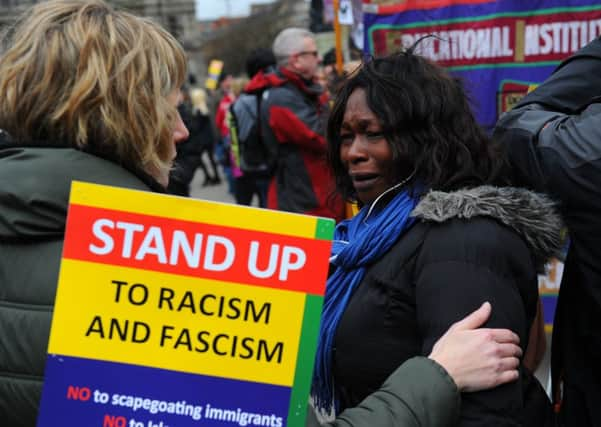One in four Scots ‘admit to racist attitudes’


The NatCen British Social Attitudes survey has shown that racial prejudice has increased in the last decade and is being fuelled by concerns over immigration and the continued impact of the 9/11 attacks in New York.
The report showed that almost a third, or 30 per cent, of Britons described themselves as either “very” or “a little” prejudiced against people of other races in the survey for 2013.
Advertisement
Hide AdAdvertisement
Hide AdBut Scotland had the second lowest number of people admitting to be prejudiced with 25 per cent.
The findings have been linked with some parties with the rise of the UK Independence Party which has campaigned heavily against uncontrolled immigration from the European Union.
However, Ukip has strongly denied that it is racist and insisted that it has highlighted the problems of ann open border.
The findings in the survey come after self-reported racial prejudice fell in the 1980s and 1990s from a high of 38 per cent in 1987 to a low of 25 per cent in 2001.
The figure then rose to 38 per cent by 2011, before falling back to 26 per cent in 2012, possibly as a result of the impact of the London Olympic Games.
Penny Young, chief executive of NatCen Social Research, said the “marked turning around” in the figures after 2001 suggested the change could be linked to the impact of the terrorist attacks in September 2001 in the US.
She added that fears over immigration were another likely contributing factor. Up until 2001, she said, the decline in self-reported racial prejudice had seemed “inexorable”.
“Back in 1983, when we started British Social Attitudes, it looked as if it was an inexorable decline, it looked like as if it was part of increasing socially liberal Britain, so things like attitudes towards same-sex marriage, having children before marriage and so on, they were all going in one direction,” she saide.
Advertisement
Hide AdAdvertisement
Hide Ad“On this trend, in about 2001, it seemed to change, and we think there are probably two possible things that are driving this. One, it was a very marked turning round in 2001, so it may well be an impact of 9/11, that people started to feel more fearful, or to do with people feeling concerned about the impact of immigration in their own area or being fearful of the impact of immigration in their own area.”
The area least likely to self-describe as racially prejudiced was inner London, which is one of the most diverse parts of the country, at 16 per cent, with the West Midlands the most likely at 35 per cent.
Levels of racial prejudice rose with age, with 25 per cent of 17 to 34-year-olds describing themselves as racially prejudiced in comparison to 36 per cent of over-55s.
Education had an impact on views with 19 per cent of those with a degree reporting racial prejudice, and 38 per cent of those with no qualifications.
Just over nine in 10 of those who admitted to some level of racial prejudice said they would also like to see a reduction in immigration levels, compared with around seven in 10 who said that were not prejudiced at all.
Despite Scotland having the second lowest level, political leaders warned against complacency.
Scottish Lib Dem leader Willie Rennie said: “These figures combined with the rise of UKIP in Scotland shows just what an important job we have to do to encourage a tolerant and liberal society. Unlike some, we know the scourge of racism is a problem faced in every community north and south of the border. Perhaps the nationalists will now stop lecturing the rest of the UK and end the complacent attitude that this is someone else’s problem. Liberal Democrats stood up for tolerance and openness in the European elections and we will continue to do so.”
An SNP spokesperson said: “The vast majority of people who live in Scotland support the tolerant, inclusive and outward-looking attitude that this county has. Racism clearly remains a problem, and the SNP will always confront it and celebrate the diversity of modern Scotland.”
Advertisement
Hide AdAdvertisement
Hide AdUkip, which won the European Parliament election in the UK including getting a seat in Scotland, has come under fire for racist comments by some of its candidates with one saying the comedian Lenny Henry should “get back to a black country” and another questioning why the athlete Mo Farah runs for the UK.
But Ukip leader Nigel Farage has said that just “a handful” of the parties members are racists who “creep out and embarrass the party”.
He added: “Do not ever call us a racist party. We are not a racist party.”